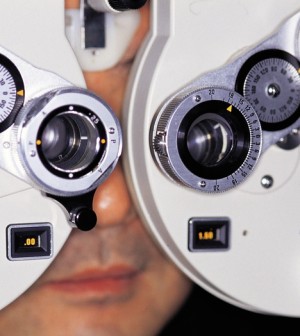- Could Your Grocery Store Meat Be Causing Recurring UTIs?
- Are You Making This Expensive Thermostat Error This Winter?
- Recognizing the Signs of Hypothyroidism
- 10 Strategies to Overcome Insomnia
- Could Artificial Sweeteners Be Aging the Brain Faster?
- Techniques for Soothing Your Nervous System
- Does the Water in Your House Smell Funny? Here’s Why
- Can a Daily Dose of Apple Cider Vinegar Actually Aid Weight Loss?
- 6 Health Beverages That Can Actually Spike Your Blood Sugar
- Treatment Options for Social Anxiety Disorder
Zika Can Also Strike Eyes of Adults: Report

Doctors in Brazil report that a man infected with Zika developed a potentially severe eye condition, in another sign that the dreaded virus can harm vision in both babies and adults.
“Zika patients should report every single symptom to their doctors, especially if they present with any kind of eye symptoms,” said report co-author Dr. Benedito Antonio Lopes da Fonseca, an associate professor at the University of Sao Paulo.
The patient, who was in his early 40s, recovered from the condition called uveitis, a kind of inflammation in the eye. But the condition can lead to cataracts and high blood pressure in the eye, said report lead author Dr. Joao Furtado, an infectious disease specialist and professor at the University of Sao Paulo.
The mosquito-borne Zika virus has struck countries around the world, and travelers have brought it to the U.S. mainland. The American territory of Puerto Rico is facing an especially high risk, potentially placing hundreds of pregnant women in jeopardy of delivering babies with debilitating birth defects.
But no nation has been more affected than Brazil. As a result of the Zika epidemic there, almost 5,000 babies have been born with a devastating birth defect known as microcephaly after their mothers were infected with Zika early in pregnancy.
The virus is typically mild in adults, according to the U.S. Centers for Disease Control and Prevention. The most frequent symptoms are fever, rash, joint pain, and red eyes, possibly caused by conjunctivitis.
In addition to the cases of conjunctivitis, many children born with microcephaly are also blind, Fonseca added. But until now, only conjunctivitis has been seen in adults with Zika virus, Furtado noted.
The new case, reported in the June 22 issue of The New England Journal of Medicine, describes a man who was infected with Zika and developed uveitis. Based on tests and observation of the patient, it’s clear that Zika was the cause of the condition, Fonseca said.
“We cured this patient,” Fonseca said, and he hasn’t had any further eye problems.
Will other Zika patients with this kind of eye problem have a similar good prognosis?
“These are questions to be answered with time. Zika is a new disease, and many aspects of it are still unclear,” Fonseca said. However, he said, patients seen by his team have done well so far after treatment.
People with the condition can be treated in a variety of ways, such as drops to the eye, injections of medications in or around the eyes, and medications taken by mouth, via injection or intravenously, said Dr. Debra Goldstein, director of the Uveitis Fellowship Program at Northwestern University Feinberg School of Medicine, in Chicago. Mild cases like this one tend to have a good prognosis, she said.
Both Fonseca and Furtado believe that Zika may cause eye problems — both conjunctivitis and the more severe uveitis — because the virus affects the central nervous system. The eye is closely linked to that system, they explained.
Matthew Aliota, a professor who studies viruses at the University of Wisconsin, pointed out that the eye doesn’t have a strong immune system, meaning that viruses may more easily replicate there.
“This has been documented among survivors of Ebola virus disease,” he said, although it’s not clear how widespread the phenomenon is.
What now?
“Ophthalmologists who see patients with uveitis should be aware that Zika is a potential cause of it,” Furtado said. “And general doctors should know that a red eye associated with Zika is not necessarily only conjunctivitis. It can be more severe than it looks.”
More information
Visit the U.S. Centers for Disease Control and Prevention for more on the Zika virus.
This Q&A will tell you what you need to know about Zika.
To see the CDC list of sites where Zika virus is active and may pose a threat to pregnant women, click here.
Source: HealthDay
Copyright © 2026 HealthDay. All rights reserved.










